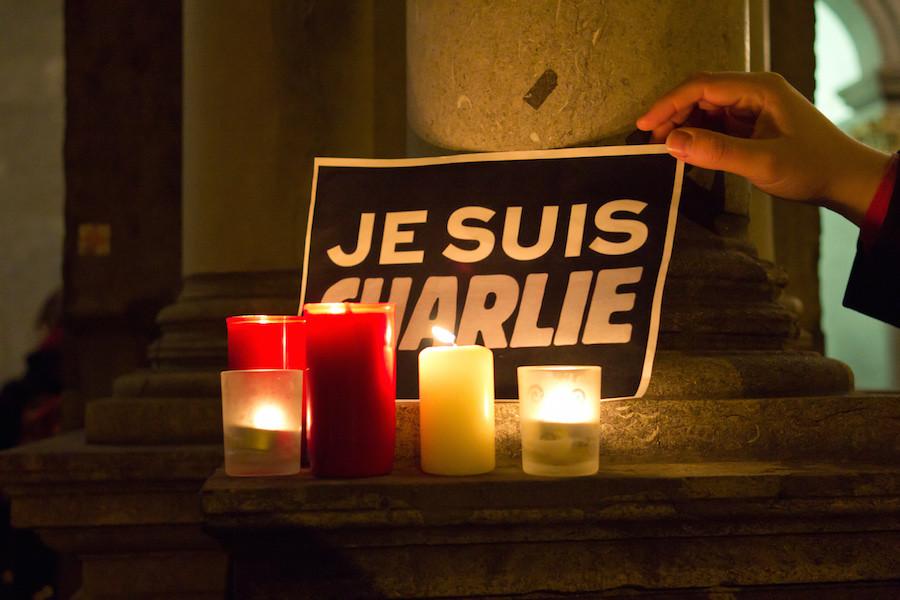Don’t give in, Charlie Hebdo
The dawn of 2015 was stained with blood by the Charlie Hebdo tragedy in France. On January 7, two Islamist terrorists vehemently screamed “Allahu Akbar” (Arabic for “God is the greatest”), as they gunned down twelve journalists of the satirical magazine.
Charlie Hebdo is a niche publication not so well known outside of France. Although I do not have extensive knowledge about it, I do have a strong opinion about murdering people for publishing something someone finds distasteful. This opinion remains unwavering, very nearly regardless of what has been published.
To declare that Charlie Hebdo should have never published cartoons portraying the Prophet Mohammed is like accusing a rape victim of wearing revealing clothes. It’s a form of victim-shaming that sheds an accusatory light on the wrong people. No one is responsible for the deaths at the offices of Charlie Hebdo except those who committed the murders.
Needless to say, Charlie Hebdo is not beyond reproach. Their abrasive commentaries have had an effect in Europe on Muslims, Arabs, and immigrants. The discourse towards these minorities has taken an uncomfortable turn, as they have been labeled as “the problem,” contributing to discrimination and lack of opportunity. Charlie Hebdo’s political discourse has, in a way, poured more fuel into the fire, fostering an unhealthy level of xenophobia among Europeans.
However, Charlie Hebdo has also lampooned the remaining two of the main Abrahamic religions: Christianity and Judaism. Its purpose has not been to mock religion for its superstition or lack of objective evidence. Rather, its objective was to promote secularism within the government. Gérard Biard, Charlie Hebdo’s editor-in-chief, stated, “Religion should not be a political argument.” It fought against religious groups forcing their ideologies on everyone. Ironically, the shootings occurred due to these very problems—of illustrating the holy prophet Muhammad, a blasphemy according to most Islamic traditions.
This is not the first time Muslim extremists have violently lashed out against similar “transgressions.” Repeated incursions have been carried out against authors, journalists and artists who have illustrated or referenced Muhammad, such as the following three examples:
The Satanic Verses controversy (1988)
Salman Rushdie’s book The Satanic Verses came under fire for including what some Muslims believed were blasphemous references. In 1989, the Ayatollah of Iran issued a fatwa ordering Muslims to kill Rushdie. The author evaded death, but some translators and publishers of his novel have been murdered or seriously injured.
Jyllands-Posten Muhammmad cartoons controversy (2006)
The Danish newspaper Jyllands-Posten published cartoons that depicted Muhammad. Muslim groups in Denmark complained, which prompted a bigger reaction that led to global protests, many of which escalated into a bloodbath, resulting in at least 200 deaths worldwide.
Lars Vilks Muhammad drawings controversy (2007)
Swedish artist Lars Vilks depicted Muhammad as a roundabout dog in a series of drawings for a local art exhibition. Protests from Muslim organizations in Sweden and condemnations from several Middle Eastern governments ensued. Since then, Vilks has been the target of numerous death threats, attacks, and assassination plots.
It is rather remarkable to see how these seemingly small publications are capable of triggering such explosive reactions, yet also frightening to think how reactionary some of these groups can be. Needless to say, not all Muslims harbor the same zealous beliefs. But it is difficult to turn a blind eye to these recurrent incidents that infringe upon people’s freedom of speech. It’s evident how a minority of extremists has the power to inflict so much damage on innocent lives.
I refuse to accept the Charlie Hebdo tragedy quietly. Anyone should have the freedom to comment on religion (and Mohammad). The moment we cease to do so, extremists have succeeded in silencing us through senseless violence and intimidation. As Hebdo’s Editor-in-Chief Biard succinctly said, “If we say to religion, ‘You are untouchable,’ we’re f—–.” I laud Biard’s moral courage, as well as the masses in Paris that have carried out peaceful protests, holding “Je suis Charlie” signs as symbols of solidarity. Speech should be countered by speech; brandishing a weapon only demonstrates insecurity and cowardice.
Sources: vox.com, nytimes.com, rt.com

Bella is Bella. This is her second year in The Talon and she now holds office as POV Columnist. She needs 12 hours of sleep each day to function properly,...











